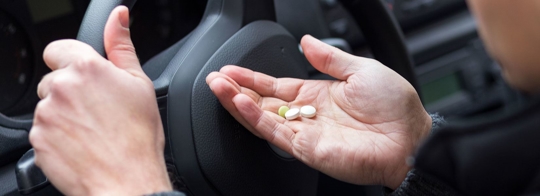When it comes to drugged or drunk driving in Boise, the law doesn’t care what substance you took to make you impaired. You can be arrested and charged with DUI whether you’ve been drinking or using drugs. And, illegal drugs aren’t the only ones that can make you impaired. Lots of people take prescription drugs that have warnings about not driving while taking the medication. Other people take too much of a prescription drug – either they do this on purpose to get high or they do it on accident.
The difficult thing for the police is determining when someone is actually impaired. When someone’s been drinking, it’s not that hard. The officer can rely on a breathalyzer. Or, worst case, they can have the suspect take a blood test at the hospital. Either way, their blood alcohol concentration level will be determined. This is a reliable indicator for whether someone is legally drunk.
It can be a lot harder when someone is under the influence of drugs. There are a few things the police can rely on to determine if someone is high. However, it’s not as easy as using a breathalyzer. There are other things the police need to do. Either way, if you’ve been arrested for DUI, you’re going to be facing some serious consequences. It’s a good idea to call and talk to an experienced DUI defense lawyer in Boise, Idaho.
What are the Things the Boise Police Look for in a Drugged Driving Case?
Unlike drunk driving in Boise, it can be harder to prove someone is high while behind the wheel. When the police first pull someone over, they look for obvious signs of impairment. Some of these include:
- Odor of marijuana
- Bloodshot eyes
- Slurred speech
- Sweating
- Nervous behavior
- Drugs or paraphernalia in plain view
- Finding drugs while conducting a search of your person or car
If any of these happen in your case, you can bet you’ll be subjected to a blood test. In these case, there’s no real measurement the cops can do at the scene. Even if they do a test kit and prove that a certain substance is indeed an illegal drug, they can’t prove how much of the drug you’ve taken. In cases like this, the police will have to use their best judgment.
Will You Still Have to Do a Field Sobriety Test?
If the police suspect that you’re under the influence of any substance, they will ask you to do a field sobriety test. It’s up to you as to whether or not you’re willing to take the test. If you do, you better perform well. The police can arrest you for DUI in Idaho if you don’t perform well on the test. This is totally subjective. This is why Idaho police record these tests on their body-cams or dashcams. Your Boise DUI defense lawyer can review this tape to see if the test was fairly administered. They can also use the tape to prove whether or not you did actually perform poorly. If not, they can challenge the arrest and ask to have your charges dismissed or reduced.
Depending on what drug a driver has used, it may or may not impair their ability to perform on a field sobriety test. For example, if you have cocaine in your system but it’s been a while since you took it, there’s a chance you could pass the test. But, is it really worth taking that risk?
Contact a Skilled Boise DUI Lawyer Right Away
If you’ve been arrested for drugged or drunk driving in Boise, you really should call and talk to a skilled DUI defense law firm in Boise. They can review your case and let you know what penalties you might be facing. They can also look to see if there are any holes in the prosecutor’s case. If so, they’ll work hard to get your charges dismissed or reduced. If that doesn’t happen, they’ll have no problem defending you at trial. Their goal is to get you the best possible outcome.
Call today and schedule your initial consultation with our office. You will have to go to your first DUI hearing within a day or so of being arrested. You don’t want to attend this hearing alone if you don’t have to. And, if it gets to the point where you have to go to trial, you really want a lawyer by your side. Having an experienced DUI defense attorney working for you can make the difference between being convicted and being acquitted of all charges. There is simply too much at risk for you to handle this on your own.

